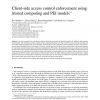2139 search results - page 50 / 428 » Distributed computing and computer security education |
124
Voted
SCAM
2005
IEEE
15 years 8 months ago
2005
IEEE
A common theme in information security is protection of trusted software components against unauthorized access by untrusted users. In the context of distributed object technologi...
120
Voted
SEC
2004
15 years 4 months ago
2004
Trusted Computing gives rise to a new supply of trusted third parties on which distributed systems can potentially rely. They are the secure system components (hardware and softwa...
242
Voted
SIGCSE
2010
ACM
15 years 9 months ago
2010
ACM
The “Hacker Curriculum” exists as a mostly undocumented set of principles and methods for learning about information security. Hacking, in our view, is defined by the ability...
160
Voted
JHSN
2006
15 years 2 months ago
2006
It has been recognized for some time that software alone does not provide an adequate foundation for building a high-assurance trusted platform. The emergence of industry-standard ...
128
Voted
CRYPTO
2004
Springer
15 years 8 months ago
2004
Springer
Unconditionally secure multi-party computations in general, and broadcast in particular, are impossible if any third of the players can be actively corrupted and if no additional i...

